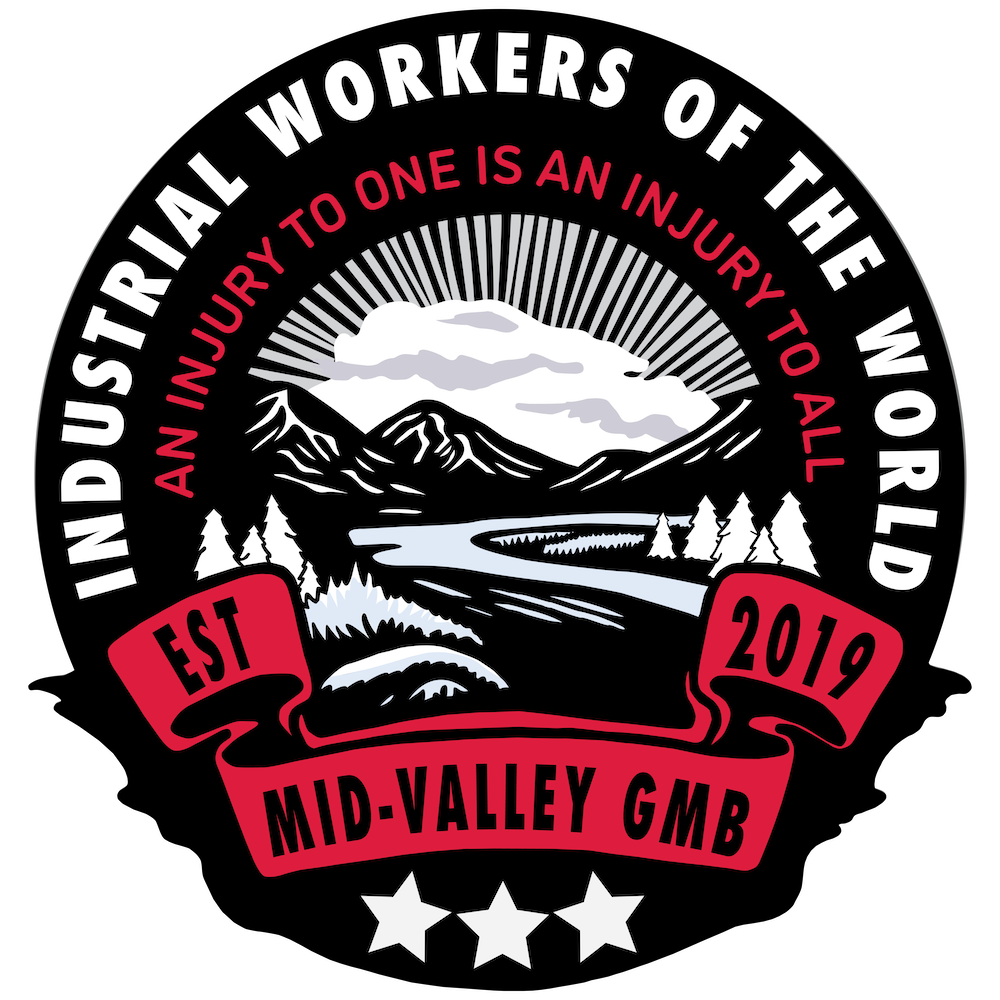Mid-Valley Organizer
September 1, 2023
No. 7
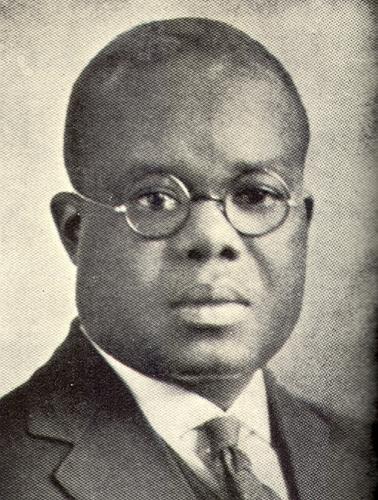
UPCOMING EVENTS
BRANCH NEWS
Join MID-VALLEY IWW & organize your workplace
MID-WILLAMETTE VALLEY, OREGON
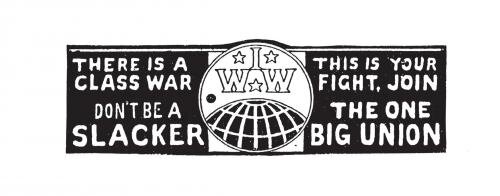
The Mid-Valley General Membership Branch of the IWW is seeking working class volunteers to support the labor movement in the Corvallis, Albany, Salem, Eugene, and surrounding areas. Our role as a General Membership Branch is to facilitate training, organizing, and other assistance for working class people in our designated region. We accomplish this by paying dues regularly, meeting at least once per month, and maintaining a democratic, decentralized model where all members take responsibility and make decisions collectively.
Mid-Valley IWW participates in local events, partners with local groups and nonprofits, and makes donations quarterly, voted on by members. We accept all members of the working class including students, apprentices, and those between jobs; law enforcement and members of the employing class are barred from holding membership in the IWW. If you’re interested in becoming a volunteer organizer for a historical, revolutionary union, visit midvalleyiww.com or email info@midvalleyiww.com to get started.
Mid-Valley IWW
2023 IWW-NARA Convention
Seattle, WA
- The 2023 Industrial Workers of the World North American Regional Administration will take place in Seattle, Washington from September 2-4, concluding on Labor Day.
- There are 11 initial resolutions to be considered by IWW delegates from across the the North American Regional Administration and their Branches. Topics including complaints reform, dues waivers for formerly incarcerated workers, programs to consider continuing or dissolving, solidarity with railroad workers, and more.
- A Convention Report will be in the next issue, coming November 1.
Hubert Henry harrison
Journalist, Editor, Public Intellectual
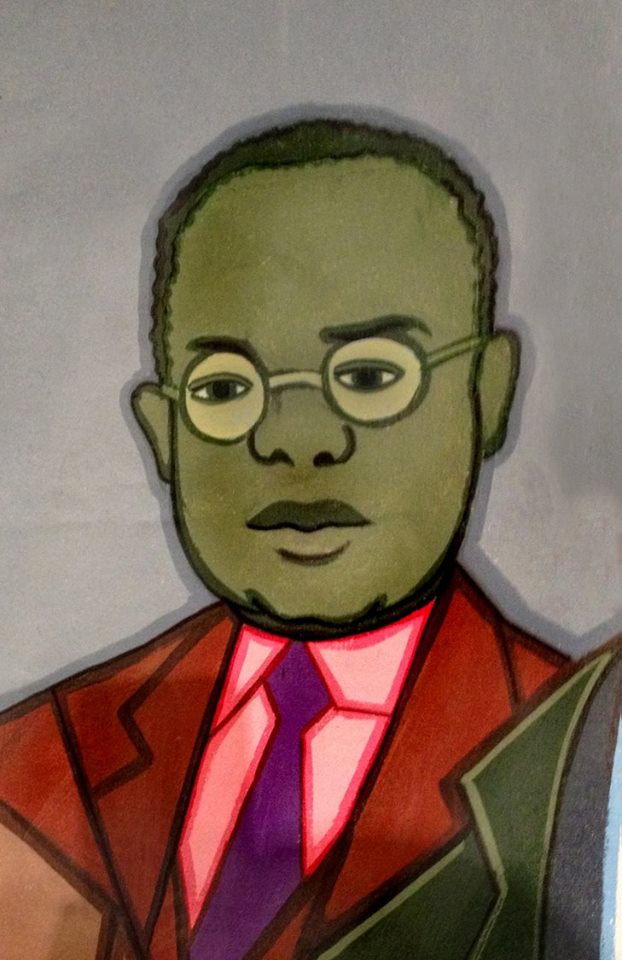
Every era has its philosophers, yet in the industrial age, few resonated outside the Eurocentric sphere of thought as profoundly as did Hubert Henry Harrison. The Black Socrates’ voice echoed through the streets of Harlem with clarity and conviction on the subjects of race, class, labor, socialism, critiques of religion and so-called leaders, colonialism, and current events of the time. Born in St. Croix in 1883 to working class parents, Harrison had experienced the effects of colonialism firsthand while living under Dutch colonial rule in the Caribbean. Later migrating to New York in 1900 following the death of his mother in 1899, Harrison sought improved living conditions through labor and self-education; Harlem became both his home and his classroom. Hubert was also an avid reader in a variety of subjects, a characteristic that would influence a lifetime of writing, publishing, education, and public speaking.
In the years after immigrating to Harlem, Harrison worked for the United States Postal Service as a postal clerk from 1907 until their dismissal in 1911, which came at the behest of the well known author and presidential advisor, Booker T. Washington, who reportedly urged their connections to fire Harrison from USPS following Harrison’s critique of Washington’s passive philosophy on the question of how to earn rights for Black Americans. This rivalry and subsequent firing preceded the transition to Harrison’s notable years as a journalist, editor, and public intellectual, where he earned the title of “Black Socrates” from powerful soapbox speeches on Harlem’s street corners. One highlight of Harrison’s timeline is their crossing of paths with Black nationalist and pan-Africanist Marcus Garvey, whose influence remained in the coming generations of Black intellectual and social forces like Malcolm X and the Black Panther Party. Harrison worked as principal editor for Garvey’s newspaper, Negro World in the early 1920s before the pair faced ideological differences that led to a split; while Garvey championed Black nationalism and economic self-sufficiency as solutions to the oppression faced by Black Americans, Harrison advocated a socialist solution, attributing racial inequality to the structures of capitalism.
In addition to a diverse interest in social and academic causes, Harrison was radically committed to the labor movement. He was outspoken in his support for the One Big Union, the Industrial Workers of the World; Harrison gave militant speeches alongside William “Big Bill” Haywood, Elizabeth Gurley Flynn, and other towering labor figures of The Industrial Era. The intersection of race and class was a focus of Harrisons’ in step with the IWW’s stance against racial discrimination. Although it was a unique stance at the time, Harrison no less criticized the American Federation of Labor (AFL), which he served as an organizer for briefly in 1918, and other major unions for their lack of consciousness. Harrison once remarked, “’the black worker was opposed by the general run of white working men, who kept them out of their unions for the most part, and yet called him ‘scab’ for getting their jobs at the only time when those jobs were available to him.”
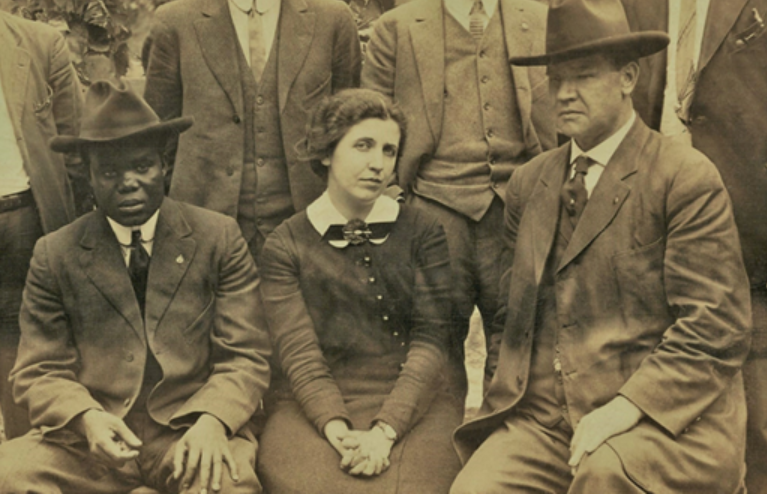
Harrison’s activism wasn’t limited to speeches and writings. His involvement in grassroots efforts made him a seminal figure in the early years of the Harlem Renaissance. The Negro-American Liberty Congress formed by Harrison was aimed at promoting equality and civil liberties for Black Americans – the autonomous Congress met and took steps to secure tangible victories against racial segregation and lynching, but were stifled by the Army’s Military Intelligence Bureau with the help of NAACP leader Joel Spingarn and W.E.B. Dubois, both who had ties to the military intelligence community. The Liberty Congress is considered by many to be a precursor to the March on Washington movements, synonymous with A. Philip Randolph and Martin Luther King Jr., that would serve as a key piece of the massive social progress made decades later.
Hubert Harrison’s life was cut short by appendicitis in 1927 at the age of 44, a devastating loss for the Harlem community and the broader Black intellectual movement. He was a powerhouse of consciousness that can’t quite be restricted to a particular ideology or movement, although Harrison’s words and actions could still be considered radically progressive even today. The Black Socrates once remarked philosophically that, “The destiny of the American Negro lies in the future of America….While the racial heart of the American Negro will always beat in response to the call of the blood, he recognizes that he is part and parcel of the American civilization. It is here that he has been the burden-bearer; having borne the burden and heat of the day, he intends to receive the wages due him here for that work.”
Jeffrey B. Perry, an independent scholar and archivist who passed away in 2022, worked extensively to tell the amazing life story of Hubert Harrison. He wrote several books on Harrison and a Reader that accompanies them, including Hubert Harrison: The Struggle for Equality, 1918-1927 and Hubert Harrison: The Voice of Harlem Radicalism, 1883-1918.
Theo Thirdaye / @thirdayetheory
RADICAL ART
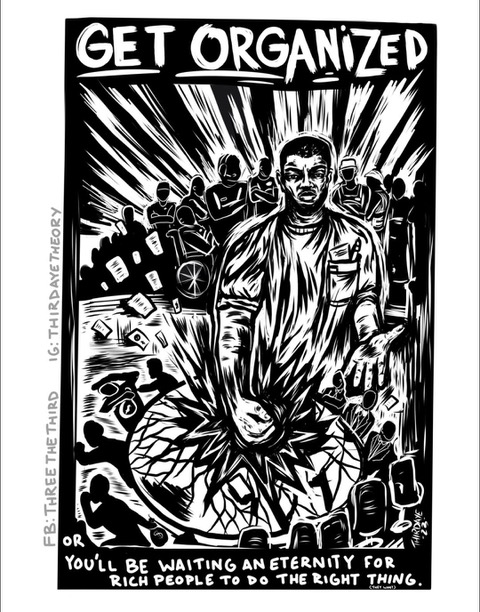
Free fridge salem
Fellow Worker William
Wobblies! Let me tell you about the Free Fridge Salem organization. This group of neighbors came together during the 2019 fires to share food, water, and masks with each other and folks without resources. Instead of a charity model, Free Fridge Salem built relationships with unhoused and vulnerable folks through mutual aid. Their Soup Squad makes soup and the Sandwich Squad makes… sandwiches! and delivers food to where people are. In addition to food and water, medical and sanitary supplies are also available. A local restaurant, Epilogue Kitchen, helps provide food while other businesses provide space for free fridges and pantries. When the City of Salem (or any city really) creates and enforces systems of violence that criminalize the unhoused, it is inspiring to see comrades build a new system based on solidarity.
Wobblies will probably find something similar in their story. A crisis, caused by capitalism, ruptures and leaves people extremely vulnerable. Then, a small group of rad organizers pull together their experience and resources to build an organization to help survive the crisis. Free Fridge Salem is still growing and supporting the community. I encourage Salem Wobblies to participate as they can. Working in solidarity with fellow workers helps us expand our radical imagination and build support to survive the ongoing crisis of capitalism. Free Fridge Salem is extremely friendly to folks new or experienced to organizing. Feeling nervous? Want a friend to go with? Let fellow worker William know!
Solidarity,
William
BUSINESS UNIONISM VS SOLIDARITY UNIONISM
INFOGRAPHIC
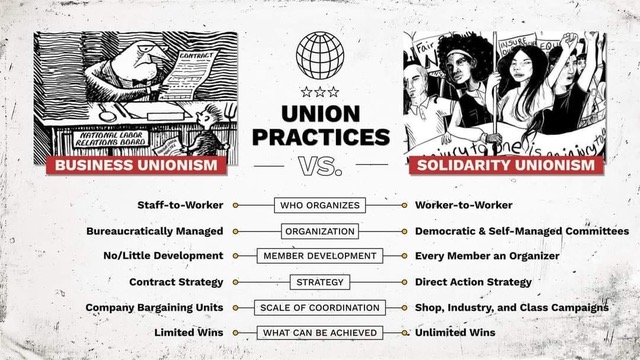
SOLIDARITY WITH LAhaina
Member Submission
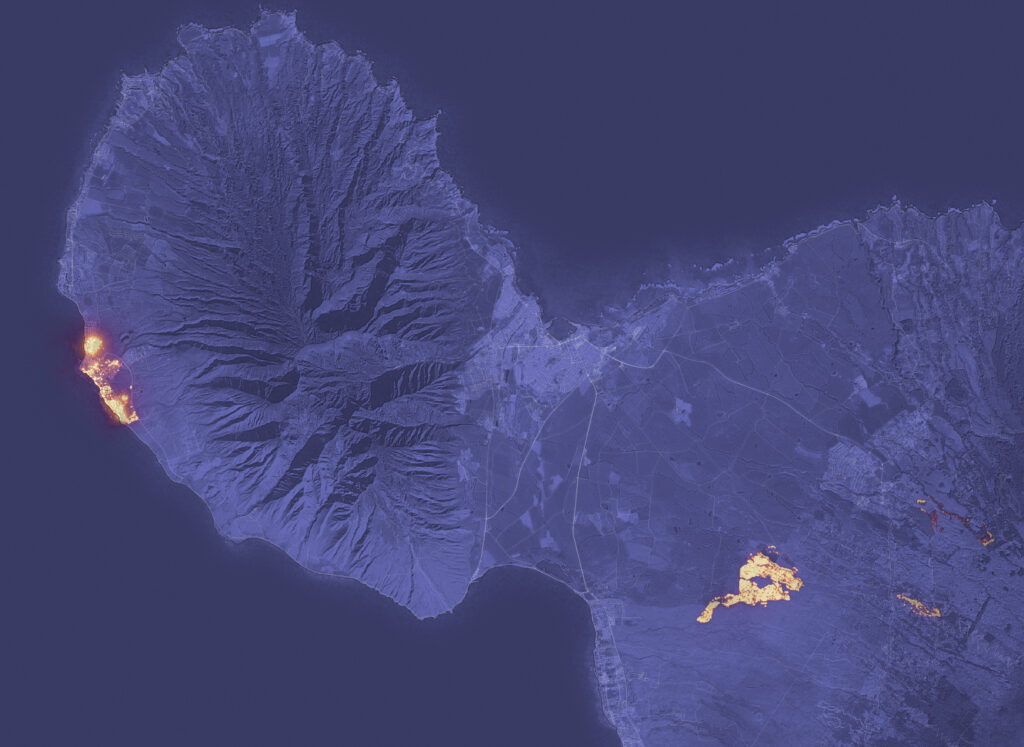
By NASA – NASA Earth Observatory – https://earthobservatory.nasa.gov/images/151688/devastation-in-maui, Public Domain, https://commons.wikimedia.org/w/index.php?curid=135804371
As many already know, a devastating wildfire swept through Lāhainā on Maui, taking the lives of many in the historic former Capital. A majority of the town was burned and the residents who were lucky to survive lost their homes and possessions. The government’s response was and has been a predictable failure; hearing the aggression and indifference in comments made by disconnected politicians in the days after the tragedy was sickening. A lack of sufficient accountability still exists weeks after the disaster.
It was once a sacred political and cultural Capital. Obsession with profit and the erasure of the community left behind many of the methods that stewards of the land utilized to mitigate disasters, and Lāhainā is no exception.
As the people continue to recover, please consider visiting @lahaina_ohana_venmo on Instagram to help assist with mutual aid for families and residents.
